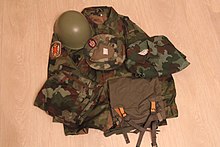Army of the Republic of Serbian Krajina
The Serbian Army of the Krajina ( Serbian Српска војска Крајине Srpska vojska Krajine ), SVK for short , was the army of the Serbs in Croatia and their internationally unrecognized Republic of Serbian Krajina from 1992 to 1995 . The SVK had a total of 35,000 to 40,000 members with an average age of around 45 years.
The International Criminal Tribunal for the Former Yugoslavia (ICTY) accuses the SVK of ethnic cleansing and war crimes against civilians. The SVK was also responsible for the rocket fire on Zagreb in May 1995, in which 7 people were killed and 214 injured.
history
After May 1990, 12,000 Yugoslav territorial defense troops , supplemented by Serbian paramilitary units and (also non-Serbian, e.g. Greek and Russian ) volunteers , formed the "Territorial Defense of the Serbian Autonomous Region Krajina" ( Teritorijalna odbrana SAO Krajine ).
From this territorial defense, the SVK was formed on October 16, 1992 under the name "Serbian Army of the Republic of Serbian Krajina" ( Srpska vojska Republike Srpske Krajine ), or SVRSK for short. According to Milan Babić , the Yugoslav secret service ( UDBA ) is said to have been involved in the development of this organization.
The task of the SVK was to conquer, control and defend the Republic of Serbian Krajina, which had arisen along the Virovitica-Karlovac-Karlobag line and which claimed the status of an autonomous state within the state of Croatia .
In Bosnia and Herzegovina , the SVK, together with the Serbian Army in Bosnia and Herzegovina, participated in the Corridor '92 military operation in Posavina and the attempt to take Bihać .
The SVK disintegrated after its military defeat, while the Croatian military operation Sturm was still in progress , in the summer of 1995 . Followers and fighters who could not be proven crimes were officially amnestied by the Croatian state .
According to Amnesty International , many former members of the SVK see themselves being prevented from returning to their homeland for fear of persecution by the Croatian judiciary and are hiding in third countries such as Serbia , Montenegro and Bosnia-Herzegovina . Out of a total of 4,350 people who were investigated for war crimes in Croatia by the end of 2002, only 35 were Croatians.
War crimes
The military of the SVK and its predecessor organizations are said to have carried out combat operations against Croatian institutions, paramilitaries, police officers and police stations , but from summer 1991 onwards they committed more and more crimes against civilians. According to the ICTY indictment, over 170,000 Croatian and other non-Serbian civilians were forcibly evicted from their localities as early as 1991 .
The indictment accuses the Serbian military and paramilitary forces of persecuting, ill-treating, raping, torturing and murdering civilians.
According to the ICTY's indictment, the leaders of the Republic of Serbian Krajina , together with the political leadership of Serbia-Montenegro and the General Staff of the Yugoslav People's Army under the leadership of Veljko Kadijević and Blagoje Adžić, formed a criminal organization ("joint criminal enterprise") .
The most famous participants were Milan Babić , Slobodan Milošević , Milan Martić , Vojislav Šešelj and General Ratko Mladić , who at the time was the supreme commander of the Yugoslav People's Army in Knin .
Web links
- ICTY indictment against Milošević for crimes in Croatia ( memento of March 12, 2009 in the Internet Archive )
- Indictment against militant leader Milan Babic
- ICTY indictment against Vojislav Šešelj
Individual evidence
- ↑ Dr. Nigel Thomas: The Yugoslav Wars (1): Slovenia & Croatia 1991-95 . Osprey Publishing Ltd., Oxford 2006, ISBN 9781841769639 , p. 32.
- ↑ ICTY indictment against Milan Martic, points 6 and 7 ( Memento of July 3, 2007 in the Internet Archive )
- ^ Indictment against Slobodan Milosevic ( Memento of March 12, 2009 in the Internet Archive )


